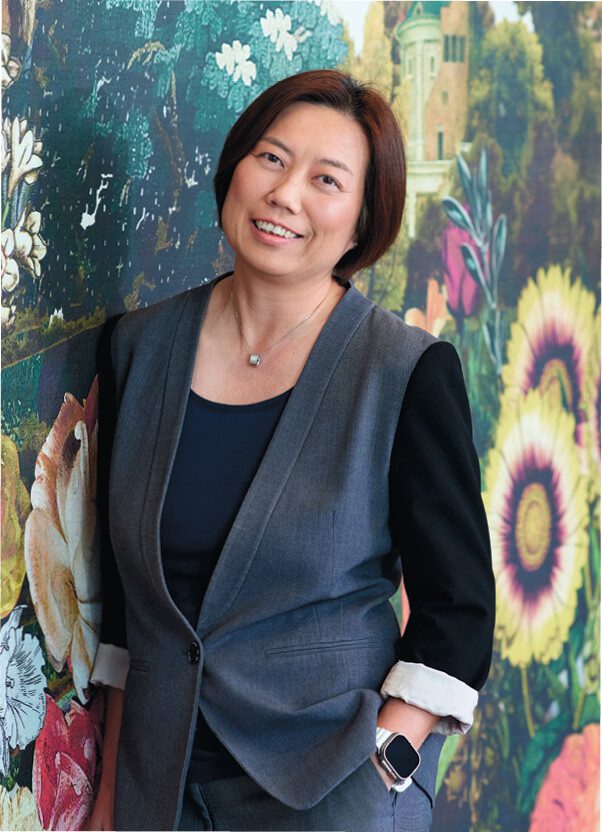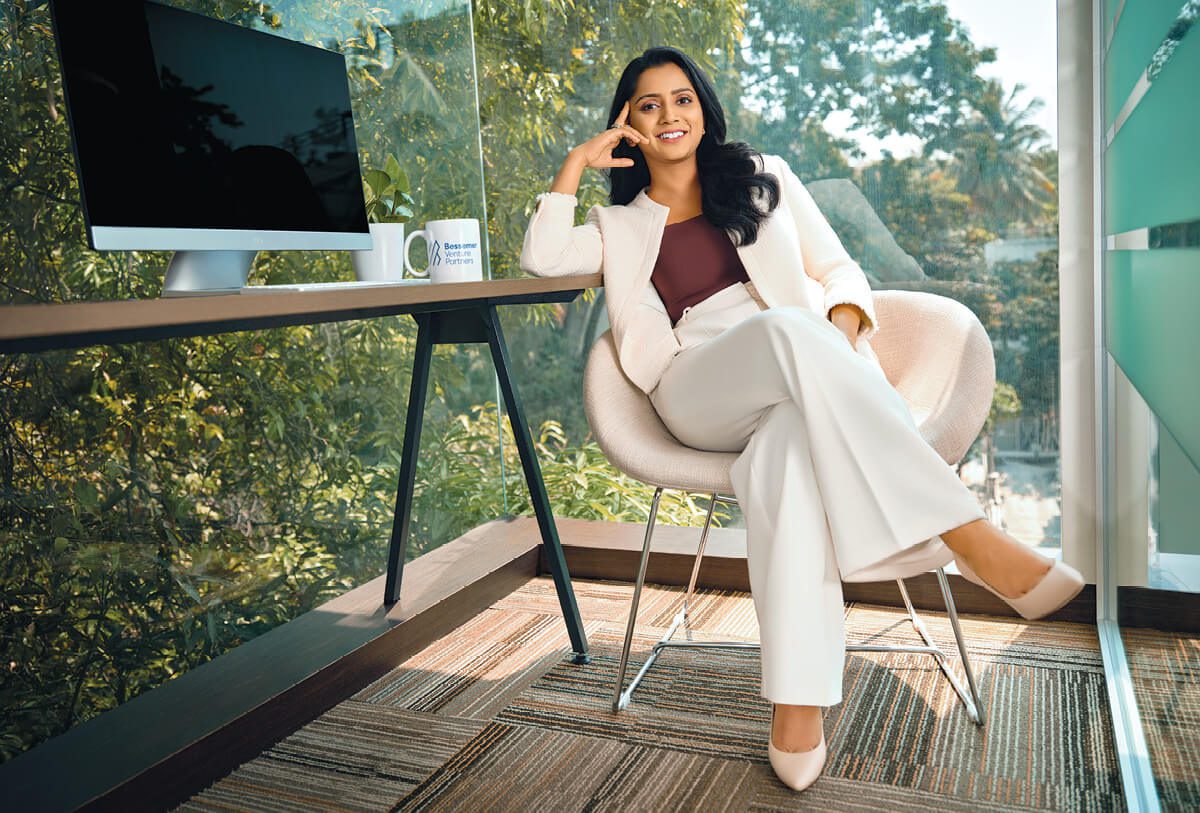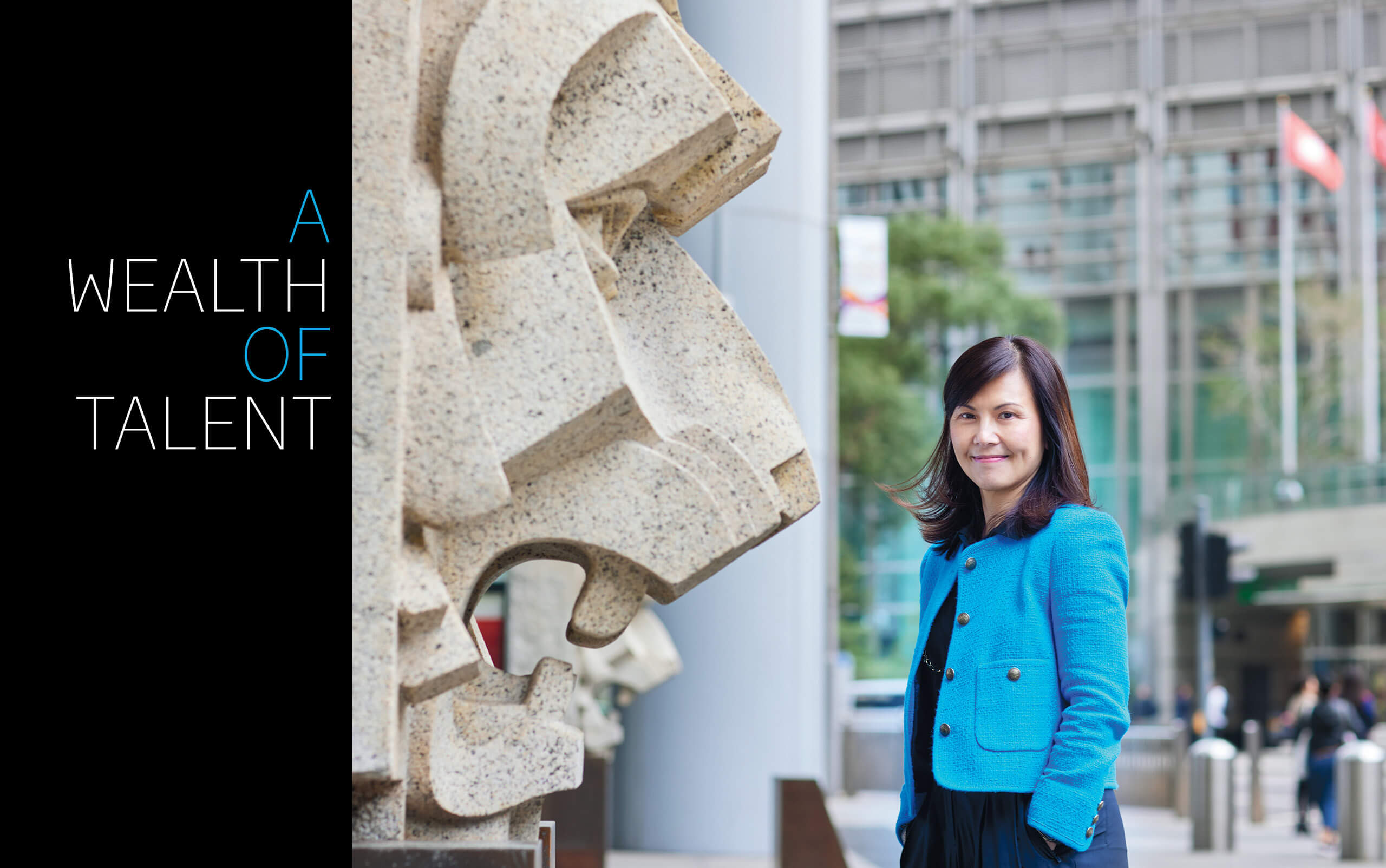Haas alumnae help evolve finance in Asia.
Christina MA, MBA 01 (shown at top), found her way into finance serendipitously. As an undergrad at Georgetown University, she had planned on becoming a diplomat but changed her mind before graduation. All she knew when she earned her diploma was that she wanted an international career in a dynamic city bursting with opportunity. Given her language skills, Hong Kong seemed a good bet. This was the mid-1990s, and China was in a stage of dizzying economic growth as it opened itself to capitalism and foreign investment.
After three months of networking, she landed a role as a proprietary equity trader at an Asian bank, a career she’d never considered largely because it was such a male-dominated field. “I had visions of Gordon Gekko from the movie Wall Street, of big guys in suspenders and slicked-back hair,” she recalls.
Indeed, as a woman, Ma was in the extreme minority on the trading desk. For some long periods over the course of her career, she was one of only a handful of women on the trading floor and in an even greater minority as a senior female trading manager globally. While the finance industry has made strides toward gender parity since the mid-90s, it remains male-dominated. According to a 2022 report from Deloitte, 19% of C-suite roles within the world’s financial services institutions belong to women—but just 14% in Asia.
Like Ma, the Haas alumnae featured here are impacting their respective niches of Asian finance. They represent both seasoned executives and up-and-comers, speaking to how the Asian finance industry has evolved and what’s on the horizon from their respective perches. Whether it’s helping to bring ESG (environmental, social, and governance) to prominence, establishing a burgeoning venture-capital market, or pushing for gender parity, all of these women are finding ways to encourage the many transformations underway in Asian finance to redound to inclusion, sustainability, and equity.
Shifting culture
For her part, Ma resolved that structural gender disparities wouldn’t hold her back. “I try to spend my energy and time thinking about what I can change, instead of fretting about what I am not,” she says.
That outlook has led to great career success and satisfaction. After three years working as a proprietary trader and junior portfolio manager at a local fund, she left to get her MBA at Haas. Upon graduation, she returned to Hong Kong and spent over two decades climbing the ranks at Goldman Sachs, first as a trader then becoming a partner and ultimately heading up Goldman’s greater China equities business. Since then, Ma has moved to HSBC, where she’s now the head of global banking, Asia-Pacific, overseeing a team of more than 500 bankers covering some of the largest corporate and institutional clients in the world.
As she’s traced this trajectory, Ma has strived to make finance more inclusive for both women and local talent. This has meant raising issues with her male colleagues they hadn’t come across before. When Ma was pregnant, for example, she had to work closely with her manager to develop her maternity leave plan—a first, since they had never had a senior trader go off on maternity leave.
“I hope that I have shown other women and men that you can succeed while being different from others and that the diversity of thought and style is valued and a good commercial decision.”
—Christina Ma, MBA 01
Fortunately, some key aspects of the culture around women at work have shifted since Ma was a young parent. The Chinese government has prioritized gender equality within its social development policies, and women there are moving closer to greater flexibility in their work hours, paid mental health leave, and longer maternity leaves.
Some economists argue that, across Asia more broadly, taking these types of steps to embrace women in the workforce will be crucial as the region’s population ages. A 2018 report from the McKinsey Global Institute estimates that improving women’s equality in the region could boost collective annual GDP by 12%.
Ma has been heartened by the finance industry’s increasing focus on diversity and inclusion initiatives, especially at the junior level, where incoming grad classes are often half women. But she acknowledges that diversity within finance’s senior leadership hasn’t evolved enough.
“I think there’s a realization that this is a much longer road,” Ma says.
Still, she believes that her journey and the efforts of others like her make an impact in important ways—one of them being the ripple effect of representation. “I hope that I have shown other women and men that you can succeed while being different from others and that the diversity of thought and style is valued and a good commercial decision,” Ma says.

Establishing the forefront
Kin-Fun Lee’s two-decade career in finance has afforded her a front-row seat to some of the most significant changes that have rippled through the industry in recent memory. In 2008, when the global financial crisis hastened a suite of regulatory changes across the region and world, Lee, MFE 05, was an executive director at J.P. Morgan in Hong Kong, overseeing business management and development for Asian equity derivatives and the prime brokerage businesses. During this time, she says, she was active in helping the firm weather a crisis unlike any seen in a generation. At the same time, she helped it contend with how new regulations—like the Dodd-Frank Act in the U.S. and what would become the Markets in Financial Instruments Directive (MiFID) in Europe—were changing the business.
As the dust settled, Lee felt pulled to help usher along some of the changes that these new regulations had seeded. “The main objective of the reforms post-crisis was to protect the end investor,” Lee says. “That got me started looking into a new area: I wondered how I could get closer to those end investors to see the real need and to provide solutions that really help them.”
“We’re seeing more sophisticated investors in some regions. They have a greater need for more complex, innovative, and bespoke products.”
—Kin-Fun Lee, MFE 05
She accepted an opportunity to do just that in 2013, decamping from her investment bank position for a job with the global wealth manager Julius Baer. As head of strategy and business operations for the Markets & Wealth Management Solutions unit covering Asia, Lee has been instrumental in developing and deploying new investment products. Her role involves assessing client demand, ensuring regulatory compliance, and aligning products with the bank’s infrastructure. For example, she and her team have been supporting the integration of new asset classes (e.g. digital assets) into traditional formats of financial instruments, like exchange-traded funds and structured products.
Anticipating what investors will need keeps Lee, her firm, and the industry on the cutting edge—an increasingly complex endeavor, she acknowledges, as some of the fast-developing Asian economies attract growing investor interest.
“We’re seeing more sophisticated investors in some regions,” Lee says. “They have a greater need for more complex, innovative, and bespoke products while at the same time fully complying with the regulators’ requirements.”
Lee predicts “continuous growth” in investor interest in Asia as a whole. As that interest continues to pour in, she sees another shift happening in terms of the investment products investors will need: “In the last generation, investors in Asia were more focused on wealth creation,” Lee says. “But now, it’s more to the stage of wealth preservation—and passing wealth along to the next generation.” Lee plans to play a central role in crafting the investment products they need to do just that.
Encouraging ESG
Anni Zhang, too, is out to update some of the ways the finance industry has done business in the past. Her focus, though, is on pushing the industry to factor in previously ignored environmental and social risks—and opportunities.
“I’ve been able to play a huge role by educating people. It can be uncomfortable for traditionally trained finance professionals to include ESG into their customary analytical framework.”
—Anni Zhang, BS 14
Zhang, BS 14, is an ESG associate for Asia-Pacific-focused private credit firm ADM Capital in Hong Kong—and, she explains, is “basically responsible for everything ESG-related day-to-day.”
Across the entire investment process—from deal sourcing to advising the investment team on the relevance of ESG factors to financial performance—Zhang is helping to ensure that environmental and social factors are taken into account. It also means creating ESG action plans for portfolio companies (which are all small- and medium-sized enterprises in Asia) and working those plans into their loan covenants. And it involves monitoring and reporting on borrowers’ ESG performance.

ADM’s founders were pro-ESG at the outset, Zhang says, and in her two years with the firm (in addition to two years with its foundation arm) she’s pounced on the opportunity to push its ESG practices to the forefront of the industry.
“I’ve been able to play a huge role by educating people,” she says. “It can be uncomfortable for traditionally trained finance professionals to include ESG into their customary analytical framework. Over time, though, I’ve seen a change in mindset with our deal teams and with the broader industry. ESG is now a key competitive advantage of ADM.”
Zhang doubled-majored at Berkeley in business and conservation and resource studies, a dual focus that she says has been instrumental in helping her to reconcile the perspectives of both finance teams and sustainability experts. In Asia, bridging these perspectives will prove increasingly critical, she says. Not only are regulations and disclosure requirements pertaining to sustainability developing quickly—but the health of the region (not to mention the planet) may depend on it.
“I see a bigger opportunity for ESG here in Asia because there are so many underdeveloped cities and economies, so there’s a lot more opportunity to do good and contribute to their development in a way that’s sustainable,” Zhang says. “There’s also incredible nature and biodiversity here. So much is at stake.”
Advancing developing economies
In the most developed parts of Asia, many of the movers and shakers within the finance industry are rooted in—and most familiar with—the region’s major financial hubs, like Hong Kong, Tokyo, and Singapore. Not so for Tab Boonthaveepat, MFE 11, an executive director and trader at Goldman Sachs in Hong Kong covering Asian emerging markets—and she considers this distinction one of her great assets.
Boonthaveepat traces her roots to Bangkok, where she grew up and began her career (after earning her MFE at Haas) as a quantitative portfolio manager at hedge fund Phatra Securities.

The many economies across Asia represent a vast diversity in their stages of development, Boonthaveepat points out. Beyond the major financial hubs, other countries, like Vietnam and Indonesia, are emerging, and the rapidly growing Indian economy is somewhere in between. Thanks in part to her background and work experience in Thailand, Boonthaveepat is deeply invested in understanding (and explaining to others) how each of these markets presents investors with its own constraints—and opportunities.
“I always want to make sure that I’m helping these small markets have a chance in the global arena.”
—Tab Boonthaveepat, MFE 11
“Emerging markets in Asia are changing,” Boonthaveepat says. “And I think especially since the pandemic, we’re seeing more interest from global investors in India and also in some of the small Southeast Asian markets.”
She’s committed to connecting this growing interest from global investors to the markets that could benefit from their capital. “I always want to make sure that I’m helping these small markets have a chance in the global arena,” Boonthaveepat says. “That’s something I’m very proud of.”
Tracking what’s next
Aparna Chaganty, MBA 23, is also interested in bringing Asia’s investment opportunities to the world, and she’s working to do so within India’s burgeoning venture capital industry. “VC, as you see it today, was simply not prevalent in India 25–30 years ago,” says Chaganty, an investor based at the Bangalore office of global VC firm Bessemer Venture Partners. “There were not enough startups to create an ecosystem for multiple large VCs to come and play here.”
“It’s an incredibly dynamic market we’re in right now, and I want to leverage my Silicon Valley experience to help Indian startups compete and win on a global stage.”
—Aparna Chaganty, MBA 23
Chaganty’s work involves meeting founders who are launching India-born startups angling for a global audience. Thanks to the rate of Asia’s—and especially India’s—economic growth, she says the opportunities to be found in the region today are unique. Pair Asia’s growth with Chaganty’s industry focus on software—which is also evolving dramatically due to the development of AI—and you get “a very special point in time to be part of this industry,” Chaganty says.

“With the advent of AI, the market is on the precipice of a transformation,” she says. For one thing, small, lean startups are able to command more scale and revenue because of the power of their underlying software. At the same time, their business models face the challenge of having to find ways to continue driving value, even as the underlying software rapidly evolves. “It’s an incredibly dynamic market we’re in right now, and I want to leverage my Silicon Valley experience to help Indian startups compete and win on a global stage.”
Chaganty extends an invitation to her fellow Haas alumnae to join her on the exciting ride. Like many other parts of finance, the VC industry is still male-dominated, and Chaganty believes it could benefit from the perspectives of more women.
What’s more, she believes such a dynamic market is likely to beget a dynamic career. “Riding the wave of the special moment we’re in here can also mean a lot of learning and personal growth as well,” Chaganty says. “That’s the bet I made.”
